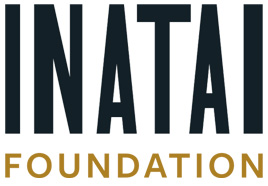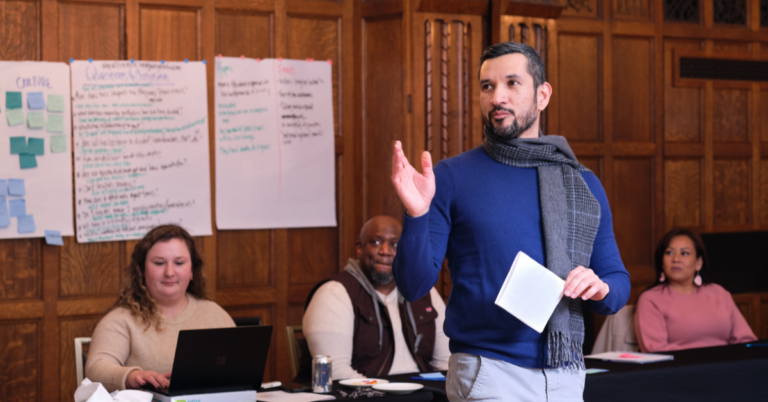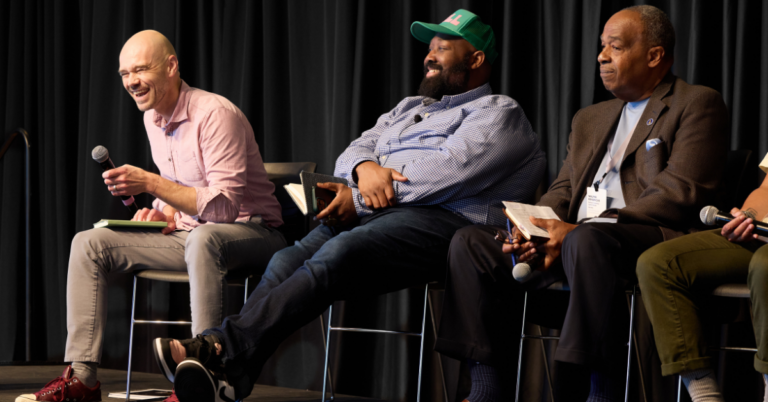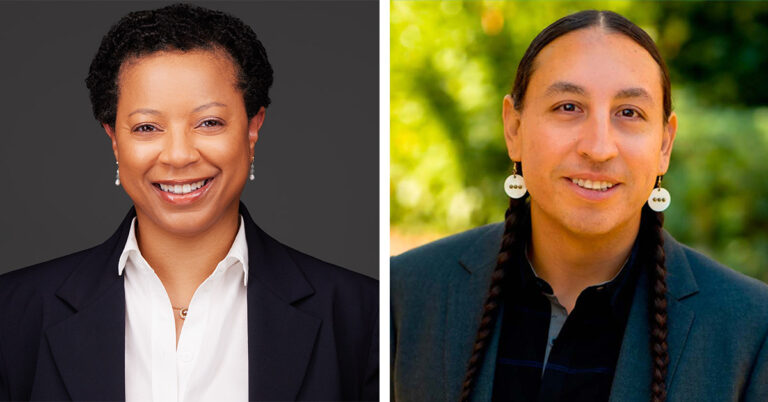Until Feb. 1, 2023, we were Group Health Foundation. This post was written under our former identity. To learn more about our new name, read our announcement here.
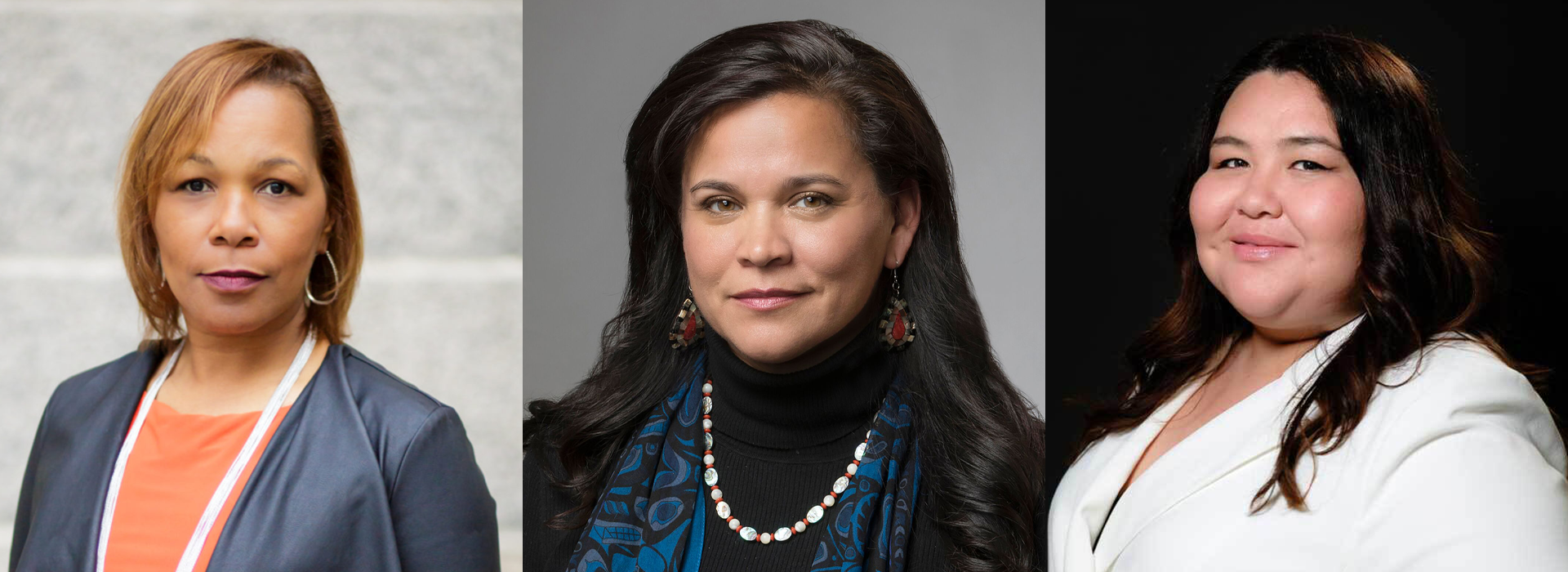
Judith Browne Dianis, Janeen Comenote, and Greisa Martínez Rosas.
As voter disenfranchisement, rampant disinformation, violence against communities of color, and other threats to our democracy intensified in recent years, Group Health Foundation accelerated funding efforts across the country that have serious implications for Washingtonians. Recognizing that upholding democratic norms is a 50-state—and more—job, Beyond Washington grants support organizations that are strengthening movement leadership, organizing with their base and allies, and building powerful coalitions with Black, Indigenous, and other communities of color, people with disabilities, queer and transgender people, immigrants and refugees, and people living with low wages.
After two voting rights bills were blocked on the U.S. Senate floor last month, we reached out to three organizations that received Beyond Washington grants to learn what’s next for them and the communities they serve. Thank you to Judith Browne Dianis (Advancement Project), Janeen Comenote (National Urban Indian Family Coalition), and Greisa Martínez Rosas (United We Dream) for taking time to share their work with us.
Judith Browne Dianis
We are experiencing the most aggressive attack in voting rights since the Jim Crow era
Executive Director, Advancement Project National and Advancement Project Action Fund
In the days after the 2000 presidential election, having just opened our doors the year before, Advancement Project moved into action to protect Black Floridians who were not able to cast a ballot for a variety of reasons. That was the launch of our Voter Protection Program, which— aligned with our theory of change—supports grassroots organizations in building power to hold systems, including election officials, accountable. We focus on working with communities to monitor the actions of local and state election officials to ensure they are not creating barriers to the ballot box. Through research, we expose voter suppression and push back against it through advocacy, communications, and litigation. At the national level, we advance narratives of an inclusive democracy and advocate for federal interventions. Lastly, we mobilize voters of color to use their power to address the issues they care about.
Now, we are experiencing the most aggressive attack in voting rights since the Jim Crow era. Unfortunately, some of the tools to stop voter suppression, like the Voting Rights Act, have been weakened in the midst of state legislative attacks. Additionally, the disinformation campaign that sows discontent about a “stolen election” is helping to fuel restrictive legislation and electoral campaigns of candidates for election administration roles, who are fixated on making voting harder, especially for people of color. It is in this moment that Advancement Project’s model of working with grassroots organizations is critical.
Our response to this moment is to do the following:
- Stop voter suppression in its tracks through litigation
- Train local advocates to monitor election officials’ actions, address suppression attempts before Election Day and be eyes and ears on the ground
- Mobilize young voters of color by highlighting issues they care about that are on the ballot and educating them about how voter suppression occurs, including the importance of Secretary of State races
- Explore states that could pass state voting rights acts
- Deploy rights restoration campaigns in states and build a national campaign to expand the electorate and expose the history of felony disenfranchisement laws as a tool of voter suppression targeting Black voters
Janeen Comenote
We recognize that voting rights are intrinsically tied to racial justice and civil rights writ large
Executive Director, National Urban Indian Family Coalition
Representative democracy is not only hardwired into core Indigenous cultural values, the governance structure of the United States is also modeled, in part, after the principles of Haudenosaunee participatory democracy. The responsibility to participate in our collective civic life sits at the forefront of the work we do at the National Urban Indian Family Coalition (NUIFC). Since 2018 we have been deeply engaged in the work of the people and advancing our collective voice and power in our body politic. We recognize that voting rights are intrinsically tied to racial justice and civil rights writ large. We also recognize that the limitation of voting rights is primarily enacted to suppress voters of color.
With over 40 percent of all Native voters living in only 36 metro areas—including about 138,000 in Washington, where we work with Native nonprofits in Seattle, Spokane, Tacoma, and Vancouver—and with elections often being won by thousands of votes, the need to protect voters’ rights has evolved into a major focus for the NUIFC. As states across the country actively legislate to make the voting process less accessible, many of the Native communities in which we work will be adversely impacted. To combat this, we will be working with more than 25 centers across 20 states to help provide people with up-to-date information on how best to cast their ballots by making sure that our member organizations have voter registration infrastructure, talking points, materials explaining how to vote, and anything else they would need to make sure their constituents are able to register and easily cast their vote.
To advance this mission, we will be working with other national organizations to enhance our voter registration work. We will be working to make sure urban Native people have proper identification, an understanding of what is on their ballot, information about how to request mail-in or absentee ballots, and can create a voting plan so that they are ready to cast their vote. The NUIFC will also remain focused on policy at a federal level, continuing to use our national platform to pressure elected officials and stand with other civil rights organizations calling for enhanced voting rights.
Greisa Martínez Rosas
We are not in a binary fight of Republican or Democrat
Executive Director, United We Dream and United We Dream Action
Thanks to the fierce advocacy driven by United We Dream and United We Dream Action at the national and state/local levels, immigration remains a central priority in the broader political landscape. As such, we and our base of allies maintain an abiding commitment to sustaining and protecting voting rights through our work. Voting is among the most powerful tools our communities have to voice concerns and enact change that reflects solution-driven policies motivated by the lived experience and collective understanding of BlPOC people, immigrants, LGBTQ+ people, etc.
UWD and UWDA are engaging in year-round base building, which provides our members with significant training and leadership opportunities in civic engagement work and turns out voters to the polls. In 2020, in the face of widespread and blatantly racist voter suppression, we spoke directly to 2 million voters, sent over 3 million text messages, and made over 800,000 calls into key battleground states to defeat white supremacy at the presidential level and all the way down the ballot. It is important for our movement to know we are not in a binary fight of Republican or Democrat, but that we are up against the continuous threat of white supremacy at all levels of government. Therefore, in 2022, our goals must be proactive in ensuring we educate and mobilize our electorate of young, Latinx, LGBTQ, and new American voters in order to combat existing and emerging voter suppression laws and tactics that seek to undermine these groups’ political power, and in order to elect people to office to restore and expand the franchise.
In this next phase of our fight to win permanent protections for millions of immigrants, and in the broader context of voter protection work across the country, we must continue to build and solidify cross-issue infrastructure, produce and share culturally relevant content, and actively strengthen a multitudinous, multiracial network of directly impacted people. United We Dream has a clear track record to guide our fight: In 2020 alone, we drove a dynamic census campaign, contacted over 1,500,000 voters by phone and text message, and created and shared content that was viewed over 93 million times by Latinx and new American voters. We will leverage tactical and creative strategies and a bustling social media presence with a reach of 5 million per month to power the next iteration of our fight in defense of immigrants and people of color.
